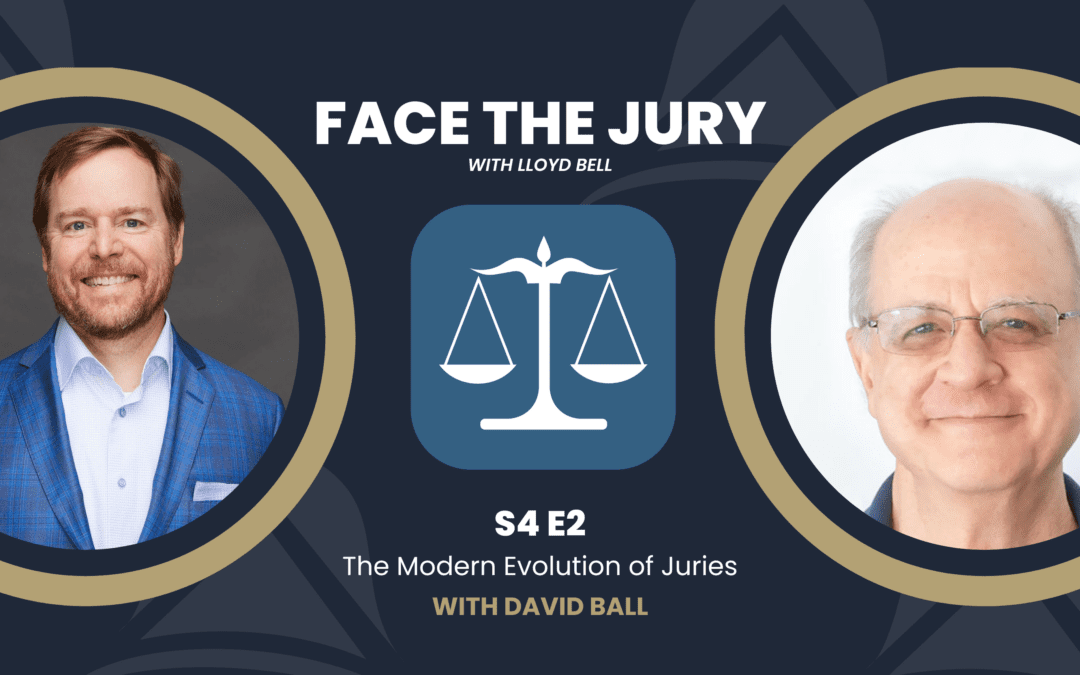In the latest episode of Face the Jury, host Lloyd Bell is joined by David Ball, one of the nation’s most influential trial consultants. David is largely known in the legal community for his and plaintiff attorney Don Keenan’s Reptile Theory strategy. David and Lloyd touch on that strategy and discuss a different approach to litigation strategy, the application of neuroscience to the courtroom and the importance of continuous learning.
The Reptile Revolution: Litigation Strategy
The Reptile Theory is a unique courtroom strategy that has changed how lawyers, especially plaintiff lawyers, approach their cases. The strategy goes back to the fundamental purpose of tort law, which works to keep society and our communities safe. By appealing to jurors’ instincts for self-preservation, the reptile approach reframes the narrative, reminding jurors of their role in upholding societal norms and safety standards.
David shares that plaintiff lawyers must show the jurors the purpose of the law and why a defendant must be held responsible for the harm they caused to benefit society and ultimately keep us safe. The courthouse, the courtroom and the case aren’t a burden to the jurors but a system created for their benefit to maintain the protection of the community. For example, if a trucking company pays damages after being found accountable for negligence in a case, it will have more incentive to better educate and train its drivers to prevent future accidents.
However, David emphasizes that the Reptile strategy isn’t about manipulation or emotional appeals; instead, it’s about aligning trial tactics with the core principles of the law. When executed properly, the approach not only strengthens the plaintiffs’ case but also serves the broader goal of maintaining a fair and just legal system.
Applying Neuroscience in Trial
A successful trial relies on a lawyer’s ability to understand and influence a jury. David’s background in neuroscience offers a unique look into the key to unlocking the secrets of effective persuasion in the courtroom. After working closely with neuroscientists at Duke and studying how jurors make decisions, David realized that the traditional approaches to litigation were fundamentally flawed.
Trial lawyers are in the business of persuading and making up people’s minds for them, which is no easy task. Traditional law school teachings often show that decision-making is strictly connected to logic and emotion, but logic is enormously affected by unconscious biases. With this knowledge, trial lawyers can craft more persuasive arguments, tapping into the subconscious drivers that shape jurors’ perceptions and judgments.
The Benefits of Continuous Learning
In the age of digital and watching screens, reading is a critical part of practicing law and continuous learning. David compares trial practice to sports—you’re not simply engaging in an intellectual exercise but actively learning to execute strategies with precision. Seminars are great, but it’s not enough to mimic the actions of others; one must understand the underlying concepts to truly excel. Books contain a wealth of knowledge that far surpasses what seminars alone can teach.
David’s advice while preparing for trial is to skim through your favorite books and notes from seminars, and you’ll notice new insights and strategies that weren’t apparent before. Complacency often accompanies success, but in the law profession, he urges lawyers to embrace a mindset of lifelong learning to avoid a plateau in their careers.
Those who invest in their education and seek new challenges maintain growth and development throughout their careers as the legal landscape evolves with the rapid changes in society and culture. By embracing the journey of self-improvement and intellectual growth, lawyers can enhance their effectiveness in the courtroom and uphold the principles of justice with integrity and excellence.
Listen to David’s episode here, and stay tuned for the next episode with our host, Lloyd Bell. Face the Jury is a podcast dedicated to confronting the issues involving medical malpractice in America– what it is, how to spot it and how to protect you and your family from medical negligence.

